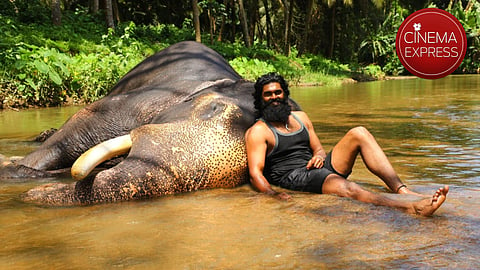Padai Thalaivan Movie Review: Shanmugapandian shines in this film that thrives and trudges in tropes
Padai Thalaivan(2.5 / 5)
Padai Thalaivan is actor Shanmugapandian's first after the demise of his superstar father, actor-politician Vijayakant. It could have taken the easy route of milking nostalgia, and even gone his father's way of featuring in a film where the protagonist saves the nation. Padai Thalaivan, thankfully, knows its strengths and tells a small story of a simple villager who loves his elephant. But this feeling didn't last long as the narration becomes haphazard in the second half. It would have been better if the nation-saving trope had indeed been explored rather than whatever unfolded in Padai Thalaivan.
The film, directed by U Anbu, begins in a remote forest village in Odisha, where a number of Tamil-speaking families suffer under a tyrant-thug-priest Thilagan (Garudan Ram), who snatches away cattle from the villagers for an undisclosed reason. The scene then shifts to Pollachi's Sethumadai, where we are introduced to Velu (Shanmugapandian), a mahout and a potter, his father (Kasturiraja), his sister, and his elephant Manian. Velu's personal debt problems force him to rent his elephant for weddings and temple festivals. Velu's burdens pile up, and in a turn of events, his elephant is snatched away by the forest officials. However, Manian goes missing soon after. What happened to him and his equation with Velu is what Padai Thalaivan is all about.
Incidentally, the film doesn't really aim big, and is content with efficiently depicting the fun and bonding between Velu and Manian, instead of giving a saviour build-up to the hero, especially since the film begins with the depiction of tyranny. We are given glances into Velu's life in a grounded manner. There is absolutely no rush in getting to the plot point, and it is a good thing, since there is a nice organic way of one scene leading to another. Velu's character design shines brightly too, and even when there are opportunities ripe for multiple displays of fury and thereby action sequences, the film pulls back its punches. It also prepares us for the first explosion, and it happens in the interval block when elephants are treated horrendously by the District Forest Officer (DFO). Such strong writing is a shining example of underlining a film's theme and characterisation without being desperate, obvious, and shabby.
Cast: Shanmugapandian Vijayakant, Kasturiraja, Garudan Ram, Yamini Sundar
Director: U Anbu
That is why the second half comes as a shocker. It is almost like all the nice things were confined to the first half. While the narration in the first half was well-connected, the second half was bogged down by numerous convenient writing choices. There are no proper explanations for how Velu reaches Odisha, especially since he was clueless in Pollachi in just the previous scene. It is also disappointing that the makers chose to bring an AI cameo of Vijayakant just when the screenplay takes a nosedive. The AI appearance has zero impact on the screenplay, and it is also technically sloppy. Padai Thalaivan is hit by the second-half curse, and it becomes even more pronounced considering how the concept of the smuggling of elephants could have conjured up something even more riveting. The final reason for the smuggling didn't feel convincing enough.
As Velu moves to Odisha and gets to know who Thilagan is, the tonal shift starts getting jarring. From a beautiful and lively relationship shared between a man and the tusker, the film shifts to social messaging and helplessly falls into the usual hero-saving-the-day film. There is nothing inherently bad about a 'saviour' film, but Padai Thalaivan never gives us a hint about the same, and throws us off guard when introducing this shift. Beginning as a film that was supposed to deal with a man and the wild bonding, Manian goes missing from the narrative for too long, and we don't really feel the strong emotions between him and Velu. The decent first half with equally decent performances goes awry when the screenplay decides to morph into the story of Velu rescuing an enslaved village.
Padai Thalaivan, with the potential of pulling off something impressive, ends up being a confused film. The writers' dilemma is whether to pen a film exploring the bond between a human and an animal or an outsider coming to a village to break the shackles of slavery and vanquish the tyrant. And in search of the battle, this film loses the war.

